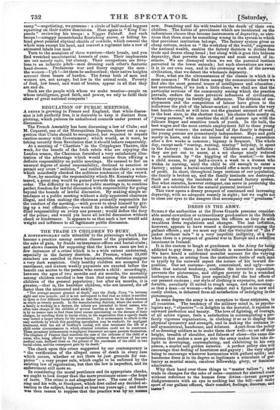REGULATION OF PUBLIC MEETINGS.
A SENSE is growing in France and England, that while discus- sion is left perfectly free, it is desirable to keep it distinct from plotting, which pursues its unhallowed councils under pretext of discussion.
The French Assembly has been discussing a law of Clubs ; and M. Coquerel, one of the Metropolitan Deputies, threw out a sug- gestion that Clubs should be recognized, but required to deposit caution-money with Government; which would, as it were, be taking security from Revolution that it should behave respectably.
At a meeting of " Chartists" in the Cripplegate Theatre, this week, for the benefit of the Irish rebels who are enjoying the London season, the Chairman furnished a very satisfactory illus- tration of the advantage which would accrue from affixing a definite responsibility on public meetings. He seemed to feel an unusual degree of moral responsibility, declined to sanction or permit any overt " sedition, ' and retired from the chair; course which manifestly checked the seditious tendencies of the crowd.
Now, by enacting the responsibility which Mr. Kenealey volun- teered, a great step would be gained towards the maintenance of order. The difficulty in respect to public meetings is, to combine perfect freedom for lawful discussion with responsibility for going beyond the bounds of lawful discussion. By making simple at- tendance at a public meeting without a duly-appointed chairman Mega', and then making the chairman primarily responsible for the conduct of the meeting,—with power to clear himself by giv- ing up a real offender,—you would fix a definite and easily ful- filled responsibility on every one present; would define the duty of the police ; and would yet leave all lawful discussion without check or hinderance. It appears to us that such a law would add weight and influence to all legitimate public discussion.


























 Previous page
Previous page